Remembering Florence
This story – Remembering Florence – is adapted from the short talk that I gave about her life at her funeral. It was quite hard to put it together, not least because there was so much that I wanted to mention about her life and I had about eight minutes to tell the story. So, this is adapted and lengthened a bit and I hope it gives a flavour of her life.
FLORENCE / MUM
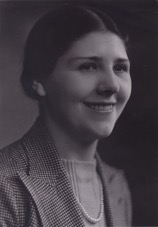
Thank you so much to everyone who has come here today to say goodbye and to celebrate mum’s life – she so loved a party.
Its my task today to talk about her life and I have found it hard to reduce her 105 years into such a short time.
You can’t tell a story about our lovely mum Florence without acknowledging that incredible long life. She’s not just a centenarian, at 105 she’s known in the scientific field as a super centenarian
So many things have happened in her life time both good and bad and she saw so much change. She was born at the start of the first world war so she lived through two world wars. She did not like talking about either of those experiences and she avoided watching TV programmes about them too. She saw the introduction in 1928 of votes for women and the setting up of the NHS in 1948, the latter of which she talked about a lot.
She saw many new inventions, some that meant a lot to her, for example electric washing machines, fridges plus TV and central heating. She did not get to experience central heating until late on in her life, but welcomed it in old age with much joy. Her husband our father was not overly keen on spending money on new ‘unnecessary’ stuff.
Florence obviously experienced many personal changes and saw family and friends through births, marriages, deaths, happiness and sad times too. There are so many people she has loved and lost and so much love that she has given and has been given through her long life.
She seemed to enjoy living in the present but she had strong memories of her past as well.
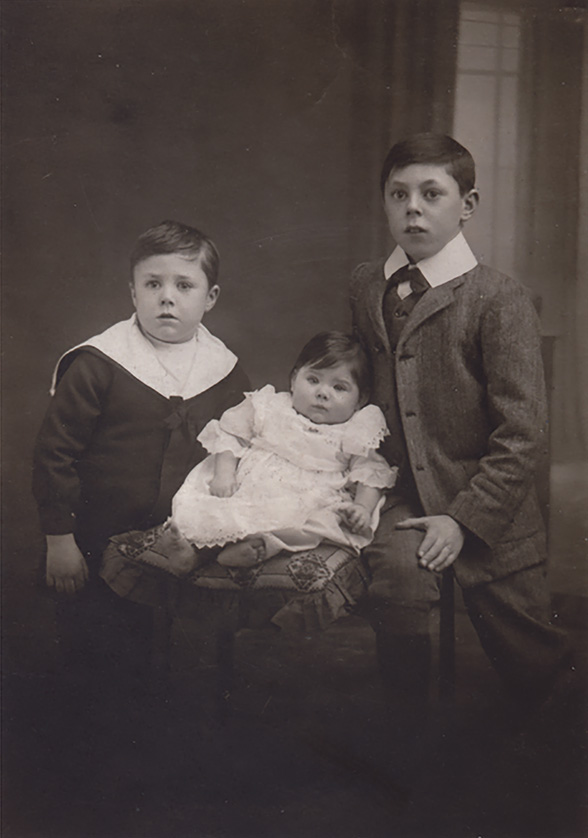
As many people will know Florence was born in North Wales. She lived in a small rural village with her mother and father and two much older brothers. She was a late baby and much loved. Most of the men in her family worked in the local colliery. The words mine or miners were never used and it took me a while to realise as I grew up, that we came from a coal mining area which happened to be based in very pretty countryside. In the language of that time and in that area, we used the terms – the pit, the colliery and the colliers.
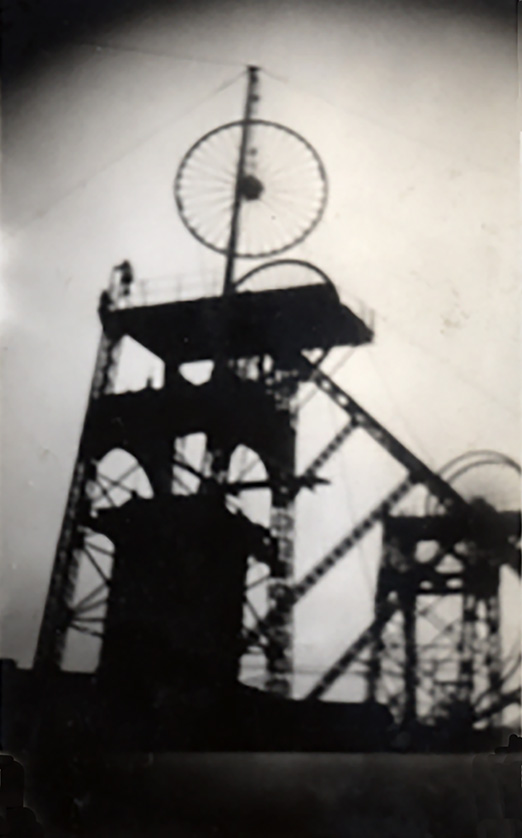
When she was young her maternal grandmother Susannah ran a fish and chip shop in the small village they lived in (which tells us something about the long time that fish and chips have been popular) and Susannah’s sister ran a small pub in a village not far away. Entrepreneurs both it seems. Although born in North Wales both these sisters slightly prided themselves on being English unlike their Welsh speaking husbands and they appear to have made no real attempt to speak Welsh, nor to teach it to their children or grandchildren.
Grandad Bill, Florence’s father who died before I was born, was a Lloyd George liberal and though he was a proud Welshman who sang in the choir of his local Welsh Baptist church, he considered that the Welsh were probably better off in the UK and, as the language would never flourish why teach it to your children – I wonder what he would think now.
Bill was the carpenter at the local colliery and also for a time, bred canaries in his garden shed to be used down the pit. He and his team built the wheel that carried the coal and the colliers up and down the pit and also made and repaired the pit props. He spent a lot of time down the pit and he and his father-in-law are recorded in the 1911 census as ‘coal miners’. Florence told stories about how on cold days she would walk to the colliery with her dad’s lunch that her mother had prepared in an enamel dish covered with a cloth. He was often down the pit when she arrived and she would sit by the huge fire in the carpenters’ workshop with his colleagues until he came back up. Bill’s father-in-law, Florence’s maternal grand-father Henry was the foreman of the ‘lamp room’. Both Bill and Henry were from Welsh speaking families and Florence talked about how “they would sit for hours nattering away in Welsh”.
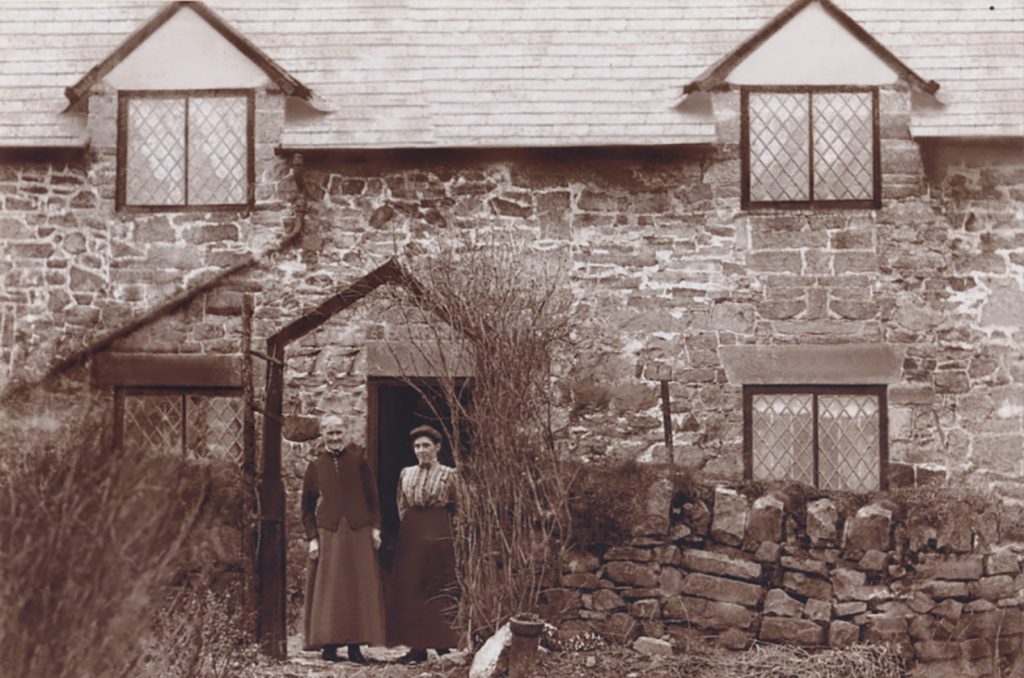
Florence was exceptionally fond of her father’s mother, her grandmother Mary-Ann or Nain as she was known to her grandchildren. Nain had been left with five children the youngest of whom was only two years old, when her husband died suddenly in his early forties. She lived in the countryside and after her husband’s death, she supported her family by turning her tiny cottage and large garden into a small-holding where she kept hens and a few pigs and grew fruit, vegetables and herbs which she sold from a stall at her gate.
Florence and Annie her mother both adored Nain and the small holding. They would regularly walk the good few miles to Wood Cottage where Nain lived. Florence would play both in the garden and down at the local stream and flour mill with children from the few surrounding farms and cottages. Nain was 96 when she died and had been still living at Wood Cottage with her youngest daughter.
Florence told her stories of family and childhood memories throughout her life and in her later years particularly, she seemed to love telling them more and more and to find great comfort in reminiscing. Wood Cottage came up very regularly in those stories.
Florence had left school at fourteen. She worked first in a tailor’s shop though was happy to admit that sewing beyond the basics of darning a sock or mending a tear in a shirt was not her forte. So, at about eighteen she went on to train as a ‘fever nurse’, at a time when infectious diseases were rife. Her father died at the age of 62 of a pneumonia brought about by many years of working in coal dust. Florence who was then 23 years old and her mother were both devastated and for a while Florence gave up her work and stayed home to be with her mother.
Florence returned to work about a year later and worked for some years in an infectious-diseases hospital, nursing patients with diseases such as diphtheria, tuberculosis and scarlet fever.
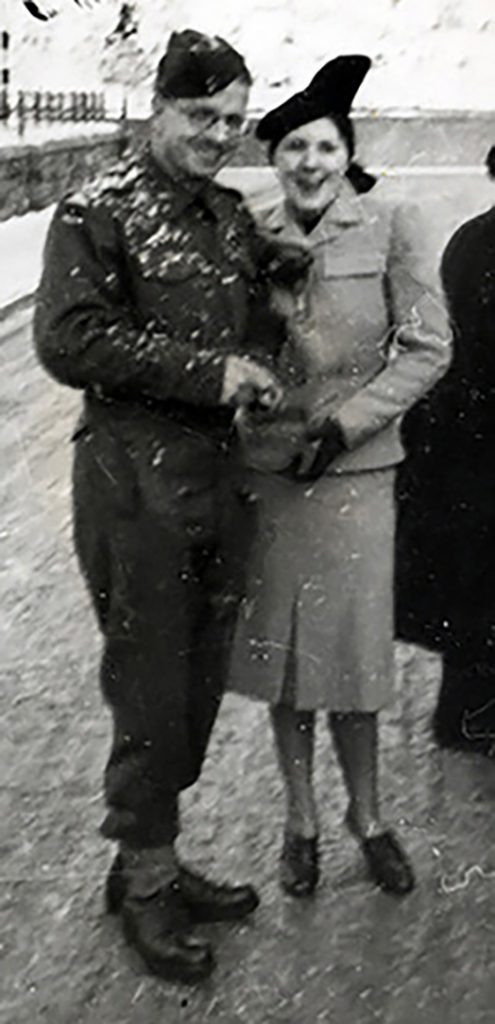
It was here that she met our father Roger. He was working as a trainee accountant and used to arrive at the hospital to give out the nurses’ weekly wages. One day while sitting at a table delivering the wage envelopes, he apparently, so he told me “plucked up courage to invite her out for coffee” and the rest as they say is history. They got married during the war. The air raid siren started as they came out of the church, my mum used to tell us.
About eleven months after they were married my elder sister Pat was born and then me a few years later. We lived with Florence’s mother Annie our Nana and the house was one of the first brick council, or ‘corporation’ houses. A long street of what were called ‘steel houses’ or ‘prefabs’ were very near to ours and these housed the majority of the colliers and their families. They were, my Nana maintained, “a very rowdy bunch, particularly on a Saturday night”.
There was a porch into our house just outside the back door. On one side this housed the only lavatory for the house and the coal house was on the other side of the porch. We had no electricity because my Nana thought it was dangerous and expensive, so we had gas mantles downstairs and we went to bed with candles. This lack of electricity went on until 1966 when Nana died. This was because although the council had tried to install electricity to her house on many occasions, Nana had stood her ground and refused to let them do it, much to the distress of Florence and her brothers. Nana was a tiny person and had to light the gas mantles every night standing on a chair, which she did well into her 80s.
My father retrained after the war as a teacher and we went to live in Chester about 20 miles away on a new council housing estate where he taught at the local school. Florence worked 3 nights a week in a nearby mental hospital. Each morning when she had been working, we would walk with my dad across the fields, to meet her. She stopped working when my younger brother Pete was born, a late addition just as Florence had been.
Both Florence and Roger were very involved with the local church community and Florence was a volunteer helper with the council meals on wheels service until well into her 80s. She also worked in her 70s and 80s with a church group making lunches once a week for those whom she called ‘the older people’ in the community.
When my two daughters were born and I was working full time, Florence would always be willing to climb on a train and come straight to our home if the children were ill. She was a great Nana to my children and later to those of my brother, she was a much loved great-grandma too.
After Roger died quite suddenly at 80 years of age Florence who was about 75 was on her own for the first time in her life. I remember as they had got older my dad would say “I don’t know how your mother will manage when I’m gone she’s never had a cheque book or managed money in her life”. But in fact, up until the last two years of her life Florence insisted on paying every bill herself by cheque and on time. I think she had a knack of hiding her talents well.
With much support from family and very good friends she quite soon began to thrive again after Roger died. She made strong friendships with a few women neighbours who were also on their own. It was here that her liking began for a small whisky in the evenings as they sat around in each other’s houses putting the world to rights and no doubt sharing their stories.
Holidays also began to play more of a role. Florence went on trips both at home and for the first time abroad, with family members or with her church group. She went to Majorca, Amsterdam, Paris, Florence and Venice and on one wonderful trip to Jordan and Jerusalem with a church group, she rode into the ‘lost city’ of Petra on horseback. She was 80 and had never really ridden much at all in her early life.
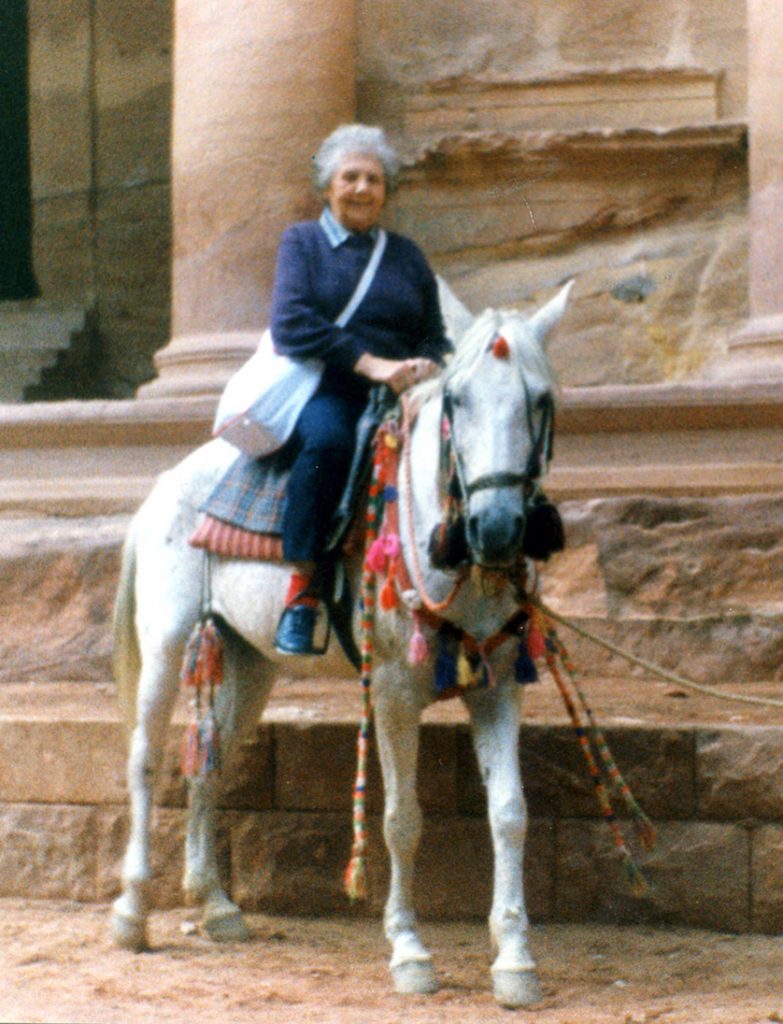
Florence loved to cook and most of all to bake. Every Friday when we were children, she baked up a storm – pies, fruit loaves, scones and mince pies. After my dad died, for many years she would come to our house in London for Christmas. We had a routine on Christmas morning: having previously baked the mince pies, she prepared the bread sauce and the rum sauce and then sat in the kitchen while my husband and I prepared Christmas dinner. First, we had carols then it was always Abba’s greatest hits that she wanted and we all sang along at the tops of our voices and often danced too. (We played ‘Dancing Queen’ by Abba as we all left the Chapel at the end of her funeral)
At 97 Florence sold up and left the house she had lived in for over 60 years. Life on her own far away from her family and with the death of many friends and good neighbours had become difficult. She moved into a flat in a sheltered accommodation block, near to where my brother and his family lived. Everyone was worried about whether she could manage this huge change at her advanced age and at first it was difficult for her. She had dizzy spells and was anxious and a bit agitated. But she settled down fairly quickly with much help from the wonderful people around her. Florence was happier than she had been for a long while and this state of contentment lasted for some six or seven years.
Then, gradually and really just over the last couple of years in her flat, she became increasingly both physically and mentally more frail and tired. She spent her last few months in hospital followed by a short spell in a very comfortable care home, having had quite a gentle fall that had resulted in a fracture of her lower leg and a considerable increase in frailty.
I have thought lots about Florence since she died. She was a lovely and a very ordinary woman of her time, as I am sure she herself would happily admit. She became rather less conventional as she grew older.
It was not just that she lasted to the remarkable age of 105, but that she was able to move with the times and to deal philosophically with all sorts of things that would have been frowned upon in her younger days. It was always interesting to see how she managed to do this as she was often dealing with family events and changes that would have been taboos in her younger days. But she took them all in her stride.
She even learned how to operate various bits of machinery and technology that were new to her.
She didn’t seem to let old age depress her too much even as her world was shrinking quite rapidly. She didn’t talk much about how it all felt when she couldn’t go on holiday any more, or couldn’t go out on her own, or whatever new thing she could not do. She had never really been a great talker about her feelings or anxieties, but it seemed as though when each loss was on the horizon, she would make a decision to leave it behind and to stop wanting or expecting it and to get on with and enjoy the life she did have. Having made her decisions, she could very rarely be persuaded to recross the line.
Up until the last months of her life she was almost always cheerful with a wonderful smile and a sparkle in her eyes. She knew that her smile endeared her to people and she was not averse to using it for a bit of positive manipulation every now and then. One thing she could not tolerate was being patronised. Any new carer or nurse who treated her, often with the utmost care, but in a childlike way, were given what we came to know as ‘the look’. She never said much to them, but they either changed or didn’t last long.
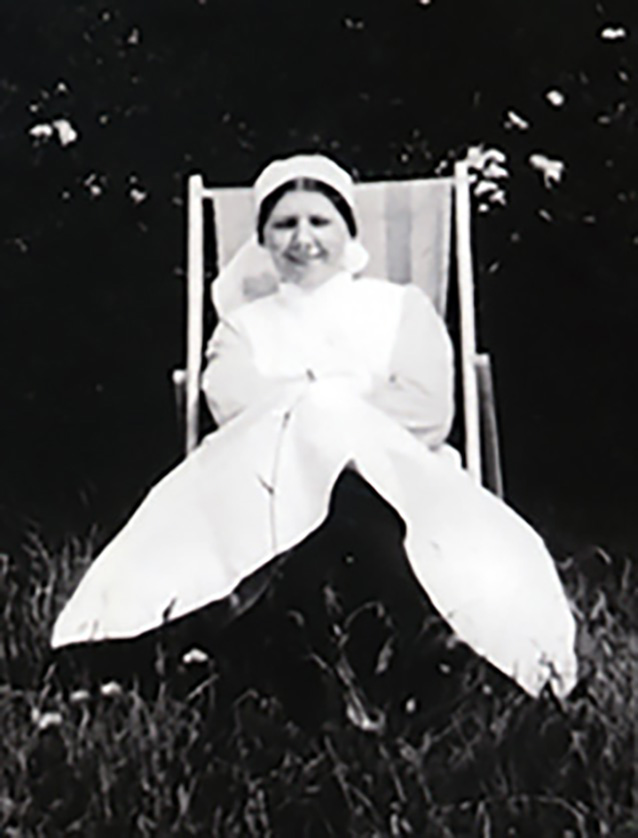
Florence seemed to defy, or at least to avoid until the last, lots of usual thinking about old age. For example, the adage ‘you go down-hill’, which of course we all do to different extents both physically and mentally and so did she. But she also seemed to grow in a number of ways as she got older, or maybe of course I just got to know her better. She remained interested in other people and the world around her and she liked to listen to what people had to say. She also knew what she liked and what she didn’t like and how to express that, sometimes quite firmly.
She certainly didn’t rush around or try and push herself or anyone else into doing things they were not keen on doing. She grew old her way and she was gentle with herself as well as with other people.
To me she was quite an inspiration